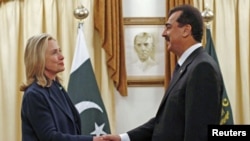On her recent visit to Pakistan, U.S. Secretary of State Hillary Clinton stressed the importance of the U.S.-Pakistan relationship. "I am here," she said, "because I believe the relationship between our two countries is so important, it is worth getting right. And I am certain it is possible, although it will take a great deal of work to do so."
The United States shares a vision of a self-sufficient and democratic Pakistan. That's why the United States is committed to helping Pakistan meet the long-term economic and social development needs of the Pakistani people. The U.S. believes that a prosperous Pakistan is more likely to be stable and secure. Toward this end, the U.S. is working to open and expand economic and trade ties between our two countries.
But Pakistan must do its part. Only the Pakistanis can remove barriers that stifle entrepreneurship. And only Pakistanis can take the tough political decisions to bring their energy crisis under control.
Pakistan's economic and political success also depends on closer links with its neighbors. Over time, Pakistan could and should become a hub that connects South and Central Asia on what the U.S. is calling a New Silk Road that binds together a region held back by rivalry and war.
And finally, Pakistan must deal with the terrorist threat. For too long, said Secretary Clinton, "violent extremists have been able to operate too freely here in Pakistan, and Pakistanis have paid a terrible price in the fight against terrorism. Nearly thirty-thousand Pakistanis have been killed or injured over the past ten years."
"But no policy," said Secretary Clinton, "that draws distinctions between so-called good terrorists and bad terrorists can provide long-term security." This year alone more than five-hundred Pakistanis have been killed by improvised explosive devices made in Pakistan. Together, the United States and Pakistan can root out all the extremists, including the Haqqani Network.
The United States and Pakistan have powerful common interests in improving their cooperation. Now is the time for both countries to chart that pathway forward together.
U.S. - Pakistan Relations Matter

"The relationship between our two countries is so important, it is worth getting right. "
















